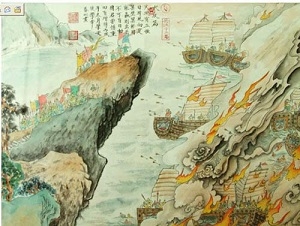(单词翻译:单击)
火攻篇 NO.3:
夫战胜攻取而不修其功者,凶,命曰“费留”。
故曰:明主虑之,良将慎之,非利不动,非得不用,非危不战。
主不可以怒而兴师,将不可以愠而攻战。
合于利而动,不合于利而止。
怒可以复喜,愠可以复说,亡国不可以复存,死者不可以复生。
故明主慎之,良将警之。此安国全军之道也。

这句啥意思:
凡打了胜仗,攻取了土地城邑,而不能巩固战果的,会很危险,这种情况叫做“费留”。
所以说,明智的国君要慎重地考虑这个问题,贤良的将帅要严肃地对待这个问题。
没有好处不要行动,没有取胜的把握不能用兵,不到危急关头不要开战。
国君不可因一时愤怒而发动战争,将帅不可因一时的气忿而出阵求战。
符合国家利益才用兵,不符合国家利益就停止。
愤怒还可以重新变为欢喜,气忿也可以重新转为高兴,但是国家灭亡了就不能复存,人死了也不能再生。
所以,对待战争,明智的国君应该慎重,贤良的将帅应该警惕,这是安定国家和保全军队的基本道理。
英文这么说:
Unhappy is the fate of one who tries to win his battles and succeed in his attacks without cultivating thespirit of enterprise;
for the result is waste of time and general stagnation.
Hence the saying: The enlightened ruler lays his plans well ahead; the good general cultivates his resources.
Move not unless you see an advantage; use not your troops unless there is something to be gained;fight notunless the position is critical.
No ruler should put troops into the field merely to gratify his own spleen; no general should fight a battle simply out of pique.
If it is to your advantage, make a forward move;if not, stay where you are.
Anger may in time change to gladness; vexation may be succeeded by content.
But a kingdom that has once been destroyed can never come again into being; nor can the dead ever be brought back to life.
Hence the enlightened ruler is heedful,and the good general full of caution.
This is the way to keep a country at peace and an army intact.
课后拓展:
1.战国时期,齐国的田单为打败围城的燕国军队,使用了火牛阵,一举大败燕军
2.彝陵之战 官渡之战 火烧博望坡 火烧藤甲兵 新野之战 火烧乌巢 火烧上方谷 火烧濮阳 火烧宛城
3.唐代 有个战例-雀撒火种攻城 薛礼东征岩洲城
4.辽朝 烧草阻敌 辽与西夏大战,西夏用火攻取胜,把其粮草给烧了,辽军战马连草都没的吃,能不胜吗?
5.戚继光 猴子烧敌营
6.郑成功 于台湾赤嵌城 火烧荷兰战船
7.朱元璋鄱阳湖大破陈友谅,这战和赤壁之战相似,陈友谅竟然也和曹操一样把战船连成一片,这一战也使朱元璋彻底击败陈友谅


